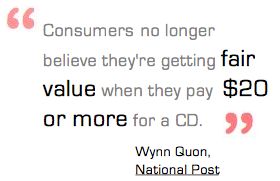Main | Online Purchasing | File Sharing | Music Services | Sources
|
|||||
| Overview A year after destroying Napster in 2001, six of the leading file-swapping programmes had as many as 14 million users in one month (Online Music Sales Declining, 2002). The RIAA responded to this surge of piracy by taking a multi-faceted approach. We’ve seen that making people feel guilty about downloading music is insufficient, inseminating fake music files onto peer-to-peer (P2P) networks makes getting music bothersome but not dissuasive, and suing college students and every other copyright infringer is impractical. The problem isn’t that the copyright laws aren’t restrictive enough or that there isn’t enough corrupted material already floating around file sharing networks, it’s that there’s no incentive to buy music, only the discouragement that stealing it is illegal.
Copyright laws |
The DMCA explicitly includes “measures that prevent unauthorised access to a copyrighted work and measures that prevent unauthorised copying of a copyrighted work” (DMCA Summary, 1998). In an official report by the U.S. Copyright Office on the DMCA, it is mentioned, “the transmission of works interferes with the copyright owner's control over the intangible work” (U.S. Copyright Office Summary, 2002). ‘Access’ and ‘control’ of media seem to be the primary concerns of the law, and with this legal backing the industry can continue its crusade against piracy.
Persecution and retaliation |
||||
|
|
|||||




